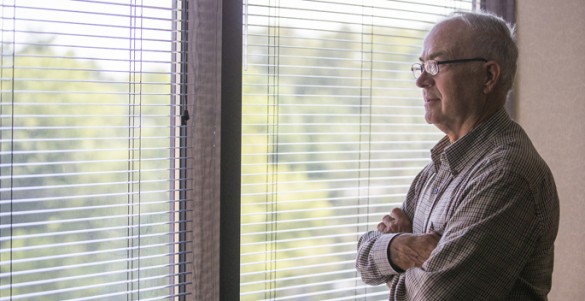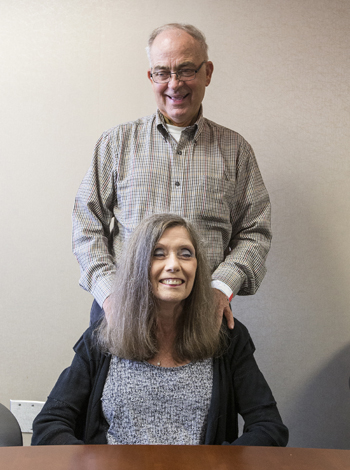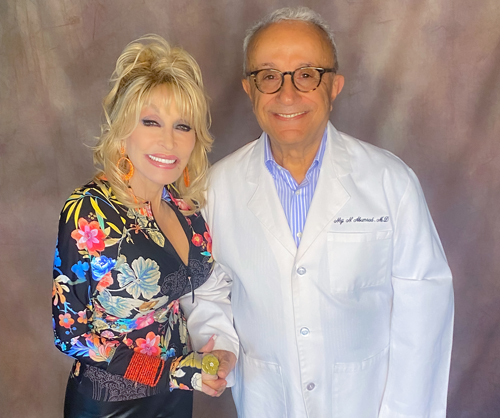
The old adage that age is just a number actually became a lifesaver for 71-year-old Rex Parton.
Faced with end-stage organ failure for both his heart and kidneys, Parton had reached the “upper age” limit many transplant centers use to determine candidacy for transplantation. He asked the team at Vanderbilt University Medical Center to look past his clinical age and focus on him as an individual.
Today Parton, the Medical Center’s oldest combined heart/kidney transplant, is four months post surgery with a good prognosis.
“We can never thank them enough for pressing forward. They gave me my life back,” Parton said. “I’m working out in the yard, trimming bushes, mowing the grass. If the doctors came down to watch me, they wouldn’t believe it!”
Nancy Parton echoes her husband’s sentiments.
“We have quality of life again and I feel like we have a future together again,” she said. “He is the love of my life and they gave him back to me.”
In the past, older patients had been excluded as candidates for transplantation due to advanced age and other health issues like kidney, lung and liver failure as well as cancer diagnosis. Advances in transplantation procedures and survival rates and an increase in the older population have prompted more health care providers to reconsider eligibility for patients 65 and older.
Vanderbilt Heart and Vascular Institute (VHVI) offers left ventricular assist devices as both destination therapy, a permanent solution for patients who are not candidates for heart transplantation, and as bridge-to-transplant, designed for patients who hope to eventually receive a donor heart.
Parton came to Vanderbilt in the summer of 2015 for evaluation for an LVAD after continued heart issues and a recent diagnosis of congestive heart failure.
Soon after his LVAD was implanted, Parton’s kidneys failed and he started dialysis. The combination was tough on his body. In February, Parton was admitted to Vanderbilt. Things were not looking good.
But there was something different about Parton, said Ashish Shah, M.D., professor of Cardiac Surgery and surgical director of Heart Transplant and Mechanical Circulatory Support.
“He was such a good patient as far as his compliance, his ability to successfully follow a complex medical regime, his high health care literacy and his self advocacy,” Shah said. “Age and renal failure made him not a good candidate on paper, but because of our collective experience, we set aside conventional wisdom and utilized our instinct.
“As a program we reflected on Mr. Parton’s case and our answer was ‘Yes. Yes we can do this and yes, they can get through this as a family.’”
Parton was listed on the transplant waiting list for both organs and returned home. Four weeks later, while finishing dinner, his phone rang.
“I cannot explain the feeling when we got that phone call,” Parton said. “I do remember being in shock and handing the phone to my wife.”
Soon after getting the news the pair called for helicopter transport, but were told the weather conditions that night were not safe to fly. Instead of opting for an ambulance, the couple decided to drive the nearly three hours from Athens, Tennessee, to Vanderbilt.
“That drive was a quiet one,” recalled Parton. “I was calming my mind, talking to the good Lord and getting prepared for surgery while Nancy drove.”
Parton received his new heart on April 12. A few hours after he was stabilized, his new kidney was transplanted on April 13. He spent nearly a month in Nashville before heading home.
“Right before the LVAD, I couldn’t walk 60 feet before I had to stop to get my breath,” Parton said. “But now, I am enjoying life. When I come out of rehab I feel so, so good. I’m up to four and a half miles a day. I am amazed myself!”
The Vanderbilt transplant team is pleased with his outcome and the impact it will have on future candidates.

“We were able to restore both life expectancy and longevity,” said Shah of Parton. “Most importantly we were able to give him back his quality of life. By simply having functioning kidneys, a functioning heart, no battery, no dialysis, no power cords — his life dramatically improved.
“But that is really small compared to what he has given our program,” he said. “No. 1, it’s an affirmation that this is a program where we tackle complicated cases, and No. 2, it has expanded our horizons and our mindset about what candidacy for advanced therapies looks like.”
According to United Network for Organ Sharing (UNOS) data from 2012 (the most recent statistics available), there were fewer than five combined heart/kidney transplants performed in the country in patients older than 70.
“It takes a village to do the type of things we do,” said JoAnn Lindenfeld, M.D., professor of Medicine and director of the Heart Failure and Transplant Section at VHVI. “Mr. Parton’s case showed us that age is not an absolute. There are some criteria that are strict and others that require re-evaluation at intervals.
“When I first met the Partons, they asked me why age was such a contraindication for transplant,” said Lindenfeld, the ICU attending. “We had an age cutoff, but he and his wife did their research and suggested that other procedures are done after age 70. I presented this to our full committee, who agreed.
“He really showed a lot of gumption in his recovery. We really are all about patient-centered care and listening to our patients and families. Their input and feelings are important in the way that we run our program.”














